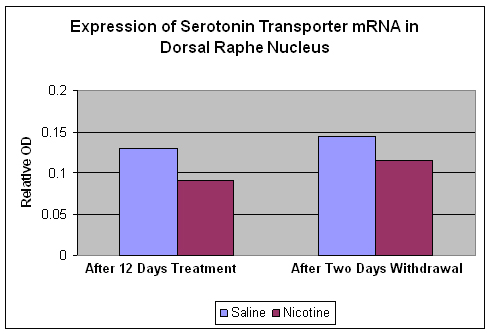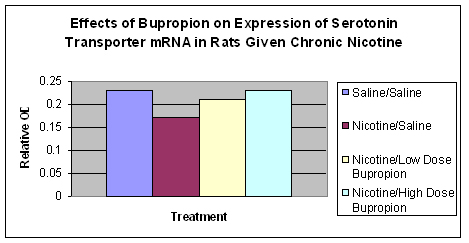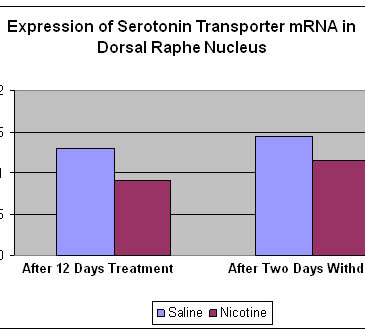Recent research has identified a correlation between nicotine withdrawal and depression. Scientists suggest that this association is related to changes in the function of serotonin transporter proteins, known to play a role in regulating mood, during periods of nicotine abstinence. This week’s ASHES reviews an animal study investigating both the biological mechanisms underlying the appearance of depressive signs, and a potential treatment (Semba & Wakuta, 2008).
Methods
- Researchers implanted adult male rats with a pump that administered either nicotine or a neutral solution (control) at a constant rate for a period of 12 days.
- A separate group of rats also received bupropion treatment at 15 or 30mg/kg/day in addition to the nicotine or control treatments.
- Researchers removed the pumps and either (1) decapitated rats on the last day of treatment or (2) allowed the rats to enter into a withdrawal state, which lasted for an additional two days.
- Researchers prepared slides of rats’ brain tissue, including the dorsal raphe nuclei.
- in situ hybridization was performed to locate the mRNA that codes for serotonin transporter proteins.
- Researchers used computer software to create photographic images from the in situ slides.
- Scientists measured the relative optical density of the slides; this distinguishes areas positive for serotonin transporter mRNA from the rest of the brain tissue because this transporter appears darker than areas that do not contain it.
- Scientists compared the relative optical densities of the experimental and control groups’ slides using a t-test as the statistical tool.
Results
- As Figure 1 shows, expression of serotonin transporter coding mRNA in the dorsal raphe nuclei of rats exposed to nicotine for 12 days was significantly decreased (-24%) when compared to the control, t (15) = 3.18, p <0.01, immediately after nicotine administration was stopped.
- Two days following the termination of nicotine administration scientists identified a lesser, but still significant decrease (-14.9%), expression compared to the control, t (14) = 2.36, p<0.05.
- As Figure 2 shows, rats who were co-administered bupropion showed smaller decreases in serotonin transporter coding mRNA; the higher the dose, the smaller the decrease observed.

Figure 1. Expression of serotonin transporter mRNA in the dorsal raphe nucleus of male rats–both after twelve days of either saline or nicotine treatment, and after two days withdrawal from treatment (Adapted from Semba & Wakuta, 2008). Click image to enlarge.

Figure 2. Effects of Bupropion on expression of serotonin transporter mRNA in the dorsal raphe nucleus of male rats (Adapted from Semba & Wakuta, 2008). Click image to enlarge.
Limitations
- Findings from animal models do not always generalize to human beings. The way nicotine effects the expression of serotonin transporter mRNA might vary across species.
- The synthesis of mRNA, which codes for serotonin transporter proteins, and the actual expression of these proteins is not always the same.
- Several similar studies have found no significant difference between control and experimental conditions. However, these studies used different tissue preparations and/or adolescent rats instead of adult rats. These differences in design could account for differences in results observed.
- Researchers are unsure how long the decrease in the expression of transporter coding mRNA lasts, and whether or not the change is permanent due to the fact that the in situ hybridization was not performed in live tissue.
- Biological processes and subjective states might not be consistent. In other words, reduced serotonin function might not cause depressed mood in rats as it does in humans.
Conclusions
Chronic exposure to nicotine can reduce the amount of serotonin transporter protein coding mRNA present in the dorsal raphe nuclei of rats. This reduction might underlie the feelings of depression that humans sometimes report while trying to abstain from smoking, making it very difficult for them to stop using products containing nicotine. Co-administration of Bupropion appears to help relieve this circumstance, and might be a useful tool to help smokers quit.
References
Semba, Jun’ichi; Wakuta, Mak (2008). Chronic effect of nicotine of serotonin transporter mRNA in the raphe nuclei of rats: Reversal by co-administration of bupropion. Psychiatry and Clinical Neurosciences, 62(4), 435-441.
What do you think? Please use the comment link below to provide feedback on this article.





adolescent addiction treatment April 8, 2009
So this is the study. Just continue it. What if all of the researchers join together? Faster result and forceful.
-jerry
VocalEK September 22, 2009
The findings provide the explanation of the biological mechanisms underlying the connection between depression and nicotine deprivation. No doubt similar mechanisms cause the anxiety, attention deficits, and memory problems linked to smoking cessation. It is long past time to consider permanent nicotine maintenance as a treatment for those with permanent cognitive and mood impairments. Current NRT products, aimed at weaning the user from nicotine, are too weak to provide therapeutic doses for most people. The electronic cigarette holds promise as a way to deliver vaporized nicotine without the harmful tar, carbon monixide, and multitude of toxins and carcinogens found in tobacco smoke.
Sewell E Peckham January 5, 2010
Serotonin levels undoubtedly make nicotine withdrawal difficult, however I believe that low sugar levels are responsible for the difficulty experienced in quitting smoking